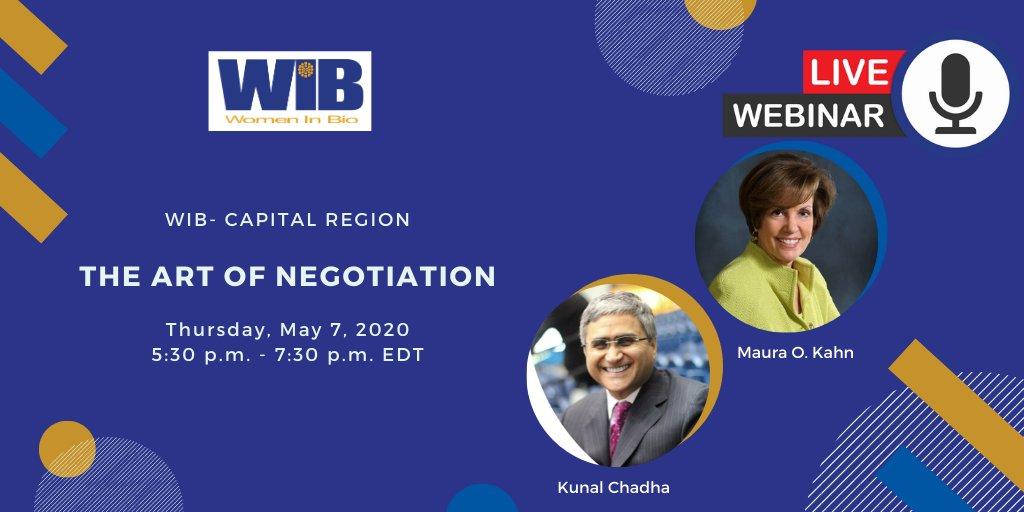
The Art of Negotiating Compensation
With Maura Kahn and Kunal Chadha
Written by: Katrina Adlerz
Negotiating compensation with a potential future employer or with a current employer may appear to be a daunting endeavor admitted Kunal Chadha, Managing Partner and Principal at Nimbus Search Partners and Maura Kahn, Senior Vice President Business Development and Marketing at Noxilizer. Fortunately, they shared strategies for successful negotiations in a recent webinar hosted by Women In Bio-Capital Region. Chadha and Kahn discussed data as well as personal experiences and offered some advice that could be applied in a changing job market affected by COVID-19.
What the Data Says About Negotiation
Chadha pointed out that only 57% of men and 7% of women negotiated job offers. What stops us from negotiating? A few common themes included fear, discomfort, and nervousness over how a negotiation will be perceived. He suggested that two shifts in one’s mindset to confront these obstacles will lead to a more successful conversation about compensation. The first shift is to redefine the goal from increased compensation to a win-win outcome in which both parties feel as though they have gotten great value. The second shift is to frame any negotiation as a desire to get the market rate for the value that you bring.
Fortunately, many resources exist to help understand market value. For example, Glassdoor, PayScale, LinkedIn, alumni associations, public companies’ proxy statements, and conversations with recruiters and others in your network were recommended as good starting points. Both Chadha and Kahn emphasized that having these data and a solid rationale are critical for a successful compensation discussion. Chadha pointed out that it may be common to hear the advice, “always negotiate” but if you instead consider compensation with these new mindsets it will lead to a better understanding of your value and how that fits with the company’s position and their compensation philosophy.
Ultimately, if a negotiation does take place, Chadha offered two strategies. First, use data to support your market value using the resources previously mentioned. And second, not to think about negotiation in binary terms but instead as a conversation, viewing the hiring manager as an ally. He also suggested maintaining your seat at the negotiation table unless it becomes clear that a win-win outcome cannot be achieved. In these situations, it is crucial to have already defined a walkaway point and to have the confidence that other opportunities will come along.
Employees have the most leverage when negotiating a new job offer, Chadha explained. Negotiations with a current employer, however, can utilize many of these same strategies. In the case of negotiating with a current employer, he noted that additional data may be useful, like specific initiatives you led, the deliverables you accomplished, and the value that you brought to the company, quantifying these whenever possible.
Translating the Data to Actionable Steps, A Personal Journey
How are these negotiation strategies applied during a career? Maura Kahn shared her personal career path and highlighted how both career stage and company type play a role in the negotiation.
If the most leverage you have is when you transition to a new job, the least leverage you have may be when getting the first job. Kahn shared that she graduated during an economic downturn and felt fortunate to find a job after interning. Thus, in that case, there was no negotiating for compensation. A tight job market, as we may experience now or in the future, would yield a similar situation. Nevertheless, Kahn was able to increase responsibilities and influence at the company and as a result, gained many opportunities over her tenure there.
After stepping away from her first job and attending business school, Kahn began to interview at large pharmaceutical companies. In this case, Kahn knew her value after receiving multiple job offers and thus had the data to negotiate compensation for the role she wanted. Kahn pointed out that the strategy she chose for the negotiation was to present the data she had acquired and asked the employer to help her understand the market value as they saw it, which ultimately helped her obtain a better compensation package.
Kahn’s first mid-career move included a physical move from the Indianapolis area to the DMV area, which played a role in the negotiation. Kahn presented data about the increased cost of living due to the move and this data, combined with an understanding of her value from conversations with her network and headhunters, which resulted in reaching a fair offer and a win-win for her and the team that she wanted to join.
Kahn explained how her next career move to a smaller start-up company presented its own challenges, even as a seasoned veteran. Start-up environments are often characterized by their high energy and sense of purpose. Kahn started at such a company as a consultant before joining the team full-time. She realized after a few months that she needed to re-negotiate her compensation. She again used resources from her network to learn market value for the position and quantified her unique value to the company to back her negotiation.
Compensation as Part of a Bigger Picture
Compensation is an important consideration during a career. Kahn and Chadha offered an empowering message that each of us is in charge of our own compensation and that we may use facts and data to control the narrative. However, the single best way to increase your compensation is to increase your value. This may mean additional training such as business school or looking for unique job and project opportunities within your organization and then delivering results. Finally, compensation, as Kahn pointed out, is an important consideration, but the company culture, job role, and importantly the people are equally as important when considering career moves.




